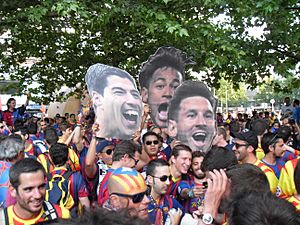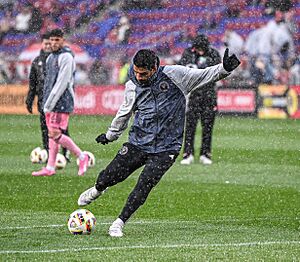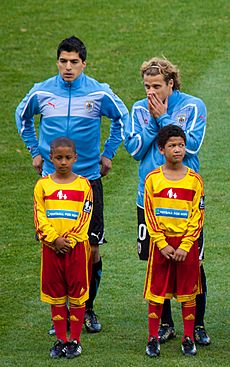Luis Suárez facts for kids
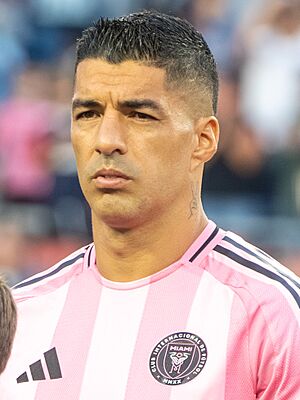
Suárez with Inter Miami in 2025
|
|||||||||||||||||||
| Personal information | |||||||||||||||||||
|---|---|---|---|---|---|---|---|---|---|---|---|---|---|---|---|---|---|---|---|
| Full name | Luis Alberto Suárez Díaz | ||||||||||||||||||
| Date of birth | 24 January 1987 | ||||||||||||||||||
| Place of birth | Salto, Uruguay | ||||||||||||||||||
| Height | 1.82 m (6 ft 0 in) | ||||||||||||||||||
| Position(s) | Striker | ||||||||||||||||||
| Team information | |||||||||||||||||||
|
Current team
|
Inter Miami | ||||||||||||||||||
| Number | 9 | ||||||||||||||||||
| Youth career | |||||||||||||||||||
| 1991–1994 | Sportivo Artigas | ||||||||||||||||||
| 1994–2000 | Urreta | ||||||||||||||||||
| 2001–2005 | Nacional | ||||||||||||||||||
| Senior career* | |||||||||||||||||||
| Years | Team | Apps | (Gls) | ||||||||||||||||
| 2005–2006 | Nacional | 27 | (10) | ||||||||||||||||
| 2006–2007 | Groningen | 29 | (10) | ||||||||||||||||
| 2007–2011 | Ajax | 110 | (81) | ||||||||||||||||
| 2011–2014 | Liverpool | 110 | (69) | ||||||||||||||||
| 2014–2020 | Barcelona | 191 | (147) | ||||||||||||||||
| 2020–2022 | Atlético Madrid | 67 | (32) | ||||||||||||||||
| 2022–2023 | Nacional | 14 | (8) | ||||||||||||||||
| 2023–2024 | Grêmio | 45 | (24) | ||||||||||||||||
| 2024– | Inter Miami | 44 | (25) | ||||||||||||||||
| International career | |||||||||||||||||||
| 2006–2007 | Uruguay U20 | 4 | (2) | ||||||||||||||||
| 2012 | Uruguay Olympic (O.P.) | 4 | (3) | ||||||||||||||||
| 2007–2024 | Uruguay | 143 | (69) | ||||||||||||||||
|
Medal record
|
|||||||||||||||||||
| *Club domestic league appearances and goals, correct as of 03:32, 17 July 2025 (UTC) | |||||||||||||||||||
Luis Alberto Suárez Díaz (born 24 January 1987) is a professional footballer from Uruguay. He plays as a striker for the Major League Soccer club Inter Miami. Many people think he is one of the best strikers ever. He is known for scoring lots of goals, moving cleverly on the field, and finishing plays with skill.
Suárez is nicknamed "El Pistolero" ("The Gunman"). He has won many individual awards, including two European Golden Shoes, which are given to the top goal scorer in European leagues. He has scored over 500 goals in his career for both his clubs and his country.
He started his senior club career in Uruguay with Nacional in 2005. He then moved to Europe, playing for Groningen and Ajax in the Netherlands. At Ajax, he won the KNVB Cup and the Eredivisie league title. In 2011, Suárez joined Premier League club Liverpool. He had an amazing season in 2013–14, scoring many goals.
Later, in 2014, Barcelona signed Suárez. There, he was part of a famous attacking trio called MSN with Lionel Messi and Neymar. With Barcelona, he won the treble (three major trophies) in his first season. This included La Liga, the Copa del Rey, and the UEFA Champions League. He also won another La Liga title with Atlético Madrid in 2021.
For his country, Suárez is Uruguay's all-time top goal scorer. He has played in four FIFA World Cups and five Copa América tournaments. He helped Uruguay win the 2011 Copa América, where he was named the Best Player.
Contents
- Club Career Highlights
- International Career
- Playing Style
- Media and Sponsorship
- Personal Life
- Career Statistics
- Honours and Awards
- See also
Club Career Highlights
Early Years in Uruguay
Suárez grew up in Salto, Uruguay, and started playing youth football at Sportivo Artigas. When he was seven, his family moved to Montevideo. There, he played for Urreta. Even after breaking a bone in his foot when a car ran over it, he kept playing football.
Joining Nacional
At 14, Suárez joined Nacional's youth team. He made his first team debut at 18 in May 2005. He scored his first goal in September 2005. He helped Nacional win the Uruguayan league in 2006, scoring 10 goals.
Scouts from the Dutch club Groningen noticed Suárez. They bought him for €800,000. Suárez was excited to move to Europe because his girlfriend, Sofía Balbi, had moved to Barcelona.
Time in the Netherlands
Playing for Groningen
Suárez was 19 when he joined Groningen. It was hard at first because he didn't speak Dutch or English. His teammates helped him get used to life in the Netherlands. He worked hard to learn Dutch, and his teammates respected him for it.
He scored 10 goals in 29 league games for Groningen. He also scored in his first European match.
Moving to Ajax
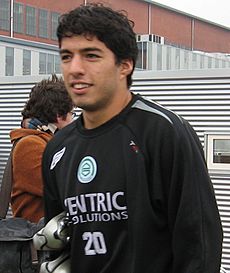
Ajax saw his talent and offered to buy him. Groningen first said no, but then accepted an offer of €7.5 million. Suárez signed a five-year contract with Ajax in August 2007.
He scored in his first league game for Ajax. In his first season, he scored 17 goals. He became a key player for the team.
Becoming Ajax Captain
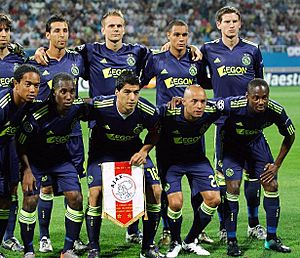
For the 2009–10 season, Suárez became the team captain. He scored many goals, including hat-tricks (three goals in one game). He scored six goals in one KNVB Cup match, helping Ajax win 14–1.
Ajax won the KNVB Cup that season. Suárez was the top scorer in the Eredivisie with 35 goals. He was named Ajax Player of the Year for the second time. He also won the Dutch Footballer of the Year award.
A Difficult Moment at Ajax
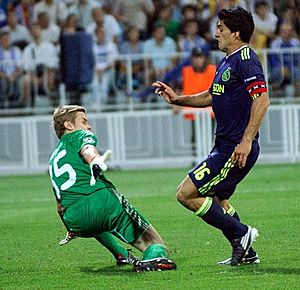
In November 2010, Suárez had a difficult moment during a match against PSV. He bit an opponent on the shoulder. Ajax suspended him for two matches and fined him. The Dutch football association increased his suspension to seven league matches. Suárez apologized for his actions.
Joining Liverpool
Transfer to the Premier League
In January 2011, Premier League club Liverpool bought Suárez for €26.5 million (£22.8 million). He signed a five-and-a-half-year contract. He chose to wear the number seven shirt, a famous number at Liverpool.
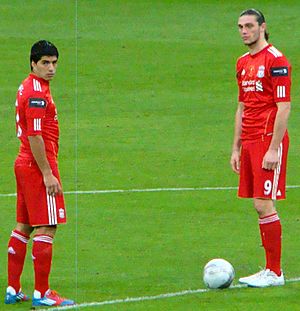
He made his Liverpool debut in February 2011, scoring a goal. He helped Liverpool improve their league position. In his first full season (2011–12), Liverpool won the League Cup. He scored his first Liverpool hat-trick against Norwich City.
Challenges and Success at Liverpool
In October 2011, Suárez was accused of using racist language towards an opponent. The Football Association (FA) investigated and found him guilty. He received an eight-match ban and a fine. Suárez disagreed with the decision.
He signed a new contract with Liverpool in August 2012. He continued to score many goals, including more hat-tricks against Norwich City. In March 2013, he scored his 50th goal for Liverpool. He was named Liverpool's Player of the Season.
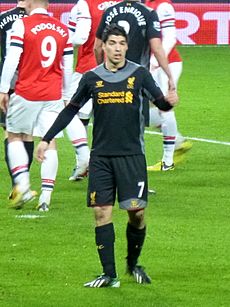
Another Difficult Moment
In April 2013, during a match against Chelsea, Suárez bit an opponent again. The FA gave him a ten-game ban. The panel said his actions were serious and that players should be role models.
After this, Suárez said he wanted to leave Liverpool. However, he later changed his mind and decided to stay. He returned to training and apologized to his teammates.
Amazing 2013–14 Season
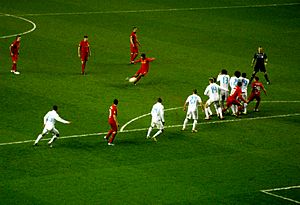
The 2013–14 season was incredible for Suárez. He scored four goals in one game against Norwich City. He became the first Premier League player to score three hat-tricks against the same club. He also captained Liverpool for the first time in a league match.
He broke Liverpool's club record for goals in a Premier League season. He finished the season with 31 goals in 33 matches, winning the Premier League Golden Boot. He also shared the European Golden Shoe as Europe's top scorer. He was named the Premier League Player of the Season.
Moving to Barcelona
Joining the Spanish Giants
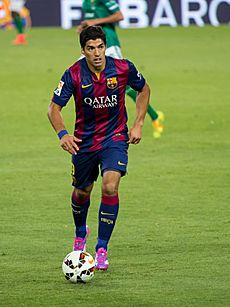
In July 2014, Suárez joined Barcelona on a five-year contract. The transfer fee was around £64.98 million, making him one of the most expensive players ever. He was given the number 9 shirt.
He missed the first part of the season due to a ban from the 2014 FIFA World Cup (which will be explained later). He was allowed to train with Barcelona during this time. He made his Barcelona debut in a friendly match in August 2014.
The "MSN" Trio and Treble Win
Suárez made his official debut for Barcelona in October 2014. He scored his first goal for the club in November in a Champions League match. In his first season, he formed a powerful attacking trio with Lionel Messi and Neymar, known as "MSN."
This trio scored a record 122 goals together. Barcelona won the treble in Suárez's first season: La Liga, the Copa del Rey, and the UEFA Champions League. Suárez scored in the Champions League final against Juventus, helping Barcelona win 3–1.
More Success and Awards
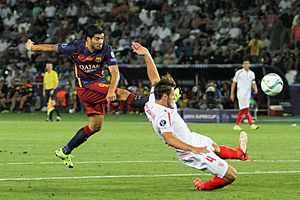
In the 2015–16 season, Suárez continued to shine. He scored a hat-trick in the 2015 FIFA Club World Cup semi-final. Barcelona won the tournament, and Suárez was named the best player.
He scored four goals in two different league matches in April 2016. He finished the season as La Liga's top scorer with 40 goals, winning his second European Golden Shoe. He also led the league in assists, becoming the first player to lead in both goals and assists. The MSN trio broke their own goal-scoring record with 131 goals.
Final Seasons at Barcelona
Suárez scored his 100th goal for Barcelona in January 2017. He continued to be a key player, helping Barcelona win the Copa del Rey for a third straight season. The MSN trio played their final season together, scoring 111 goals.
In the 2017–18 season, Suárez helped Barcelona win another domestic double (La Liga and Copa del Rey). He scored his 400th career goal during a match against Real Madrid. Barcelona also set a record for the longest unbeaten streak in La Liga history.
He won his fourth La Liga title with Barcelona in the 2018–19 season. In his final season (2019–20), he scored his 195th goal for Barcelona, becoming the club's third all-time top scorer.
Moving to Atlético Madrid
Winning La Liga Again
In September 2020, Suárez signed a two-year contract with Atlético Madrid. He made a great start, scoring two goals and assisting another in his first game. He quickly became Atlético's main goal scorer.
He scored his 500th career goal in March 2021. In May 2021, Suárez scored a crucial winning goal in the last minutes of a match against Osasuna. This helped Atlético stay at the top of the league. On the final day of the season, he scored the winning goal that secured Atlético Madrid's first La Liga title in seven years. He finished as Atlético's top scorer with 21 goals.
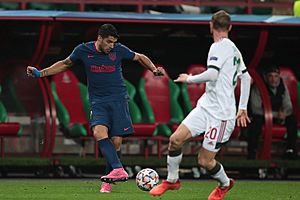
Departure from Atlético
In his second season (2021–22), Suárez continued to score important goals. He scored against his former club Barcelona but chose not to celebrate. In May 2022, Atlético Madrid announced that Suárez would leave the club at the end of the season. Fans gave him a warm farewell.
Return to Nacional
In July 2022, Suárez returned to his boyhood club Nacional in Uruguay. He made his second debut for the club in August. He scored twice in the Championship finals, leading Nacional to win the Uruguayan Primera División title.
Playing for Grêmio
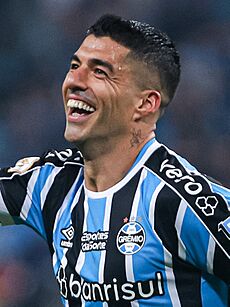
In December 2022, Suárez joined the Brazilian club Grêmio. He was welcomed by 30,000 fans. He scored a hat-trick in his debut match in January 2023.
He won his second title with Grêmio, the Campeonato Gaúcho, in April. Due to knee injuries, he decided to shorten his contract to the end of 2023. He finished the Brazilian league season with 17 goals and 11 assists. He was named the Best Player of the Brasileirão.
Joining Inter Miami
In December 2023, Inter Miami officially announced that Suárez would join the club for the 2024 season. This allowed him to reunite with former Barcelona teammates Lionel Messi, Sergio Busquets, and Jordi Alba.
He made his 2024 MLS season debut in February 2024, providing an assist. He scored his first goals for the club in March, with two goals in a 5–0 victory. In May, he scored his first hat-trick for Inter Miami, with three assists from Messi. In August, he scored the fastest goal in the club's history. By September, he had broken the club record for most goals in a regular season.
In November 2024, Suárez signed a new contract to stay with Inter Miami until the end of the 2025 season. He scored his first goal of the 2025 season in March. Later that year, in June, he scored in the 2025 FIFA Club World Cup, becoming the second oldest player to score in that tournament.
International Career
Early Years and World Cup Debut
Suárez played for Uruguay's U20 team in the 2007 U-20 World Cup, scoring two goals. He made his senior debut for Uruguay in February 2007.
He was part of Uruguay's squad for the 2010 FIFA World Cup. He scored important goals, including two against South Korea to send Uruguay to the quarter-finals.
A Controversial Moment in 2010
In the quarter-final against Ghana, the game was tied in extra time. Suárez blocked a goal-bound shot with his hands, which is against the rules. He was sent off (given a red card). Ghana missed the penalty kick that followed. Uruguay then won the game in a penalty shootout. Suárez later said he had no choice and would do it again to help his team.
Copa América Victory
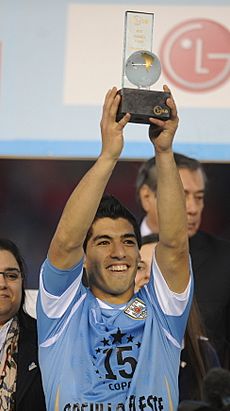
In the 2011 Copa América, Suárez was a star player. He scored two goals in the semi-final against Peru. In the final, he scored the first goal and helped Uruguay win 3–0 against Paraguay. Uruguay won their record 15th Copa América title. Suárez scored four goals and was named the Most Valuable Player of the tournament.
Later Tournaments
Suárez played in the 2012 Olympic Games as captain. He also played in the 2013 FIFA Confederations Cup, where he became Uruguay's all-time top goal scorer.
2014 FIFA World Cup Incident
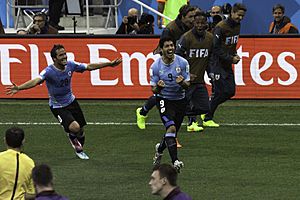
Suárez was the top scorer in the South American qualifiers for the 2014 FIFA World Cup. He scored two goals against England in the group stage, helping Uruguay win.
In the final group match against Italy, Suárez was involved in another controversial incident where he bit an opponent. FIFA banned him for nine international matches and from all football activities for four months. This was his third such incident. Suárez later apologized for his actions.
Recent International Career
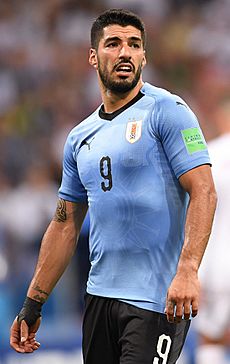
Suárez returned to play for Uruguay in 2016. He helped Uruguay qualify for the 2018 FIFA World Cup. He scored his 50th international goal in March 2018. He played his 100th game for Uruguay at the World Cup, scoring against Saudi Arabia.
He played in the 2019 Copa América and the 2021 Copa América. In the 2022 FIFA World Cup, he assisted a goal in Uruguay's final group match.
In July 2024, Suárez scored a last-minute goal in the 2024 Copa América third-place play-off, helping Uruguay win the bronze medal. On September 2, 2024, Suárez announced he would retire from the national team after the match against Paraguay on September 6, ending his 17-year international career.
Playing Style
Suárez is known for his powerful shots and great technical skills. He often dribbles past defenders by putting the ball through their legs. Many consider him one of the best strikers in the world. He has been the top scorer in three different top European leagues, a rare achievement.
He can score with either foot and from inside or outside the penalty area. He is also praised for his hard work and quick movements. He can play as a main striker or a second striker.
Suárez is also known for his vision and passing, creating many scoring chances for his teammates. He has a strong desire to win. His former Liverpool captain, Steven Gerrard, said Suárez played every game like it was a final.
Media and Sponsorship
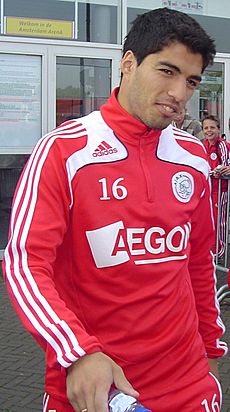
Suárez has sponsorship deals with sports brands like Puma. He has appeared in advertisements for various companies in Uruguay, including Pepsi and Samsung. He is also featured in the FIFA video game series.
He is very active on social media, with millions of followers on Instagram.
Personal Life
Luis Suárez was born in Salto, Uruguay, the fourth of seven boys. His older brother, Paolo Suárez, was also a professional footballer. When Luis was seven, his parents separated. He grew up playing football on the streets of Montevideo.
He started dating Sofía Balbi when he was 15. When her family moved to Barcelona, Suárez became even more focused on football, hoping to join her in Europe. They married in 2009 and have a daughter and two sons. He has a tattoo of his daughter's name, Delfina, which he kisses as part of his goal celebration.
In 2014, when he joined Barcelona, he was able to live closer to Sofía's family, which was a dream for him. Suárez has also helped mentor younger Uruguayan football players, like Darwin Núñez.
Career Statistics
Club
| Club | Season | League | National cup | League cup | Continental | Other | Total | |||||||
|---|---|---|---|---|---|---|---|---|---|---|---|---|---|---|
| Division | Apps | Goals | Apps | Goals | Apps | Goals | Apps | Goals | Apps | Goals | Apps | Goals | ||
| Nacional | 2005 | Uruguayan Primera División | 0 | 0 | — | — | 1 | 0 | — | 1 | 0 | |||
| 2005–06 | Uruguayan Primera División | 27 | 10 | — | — | 3 | 0 | 4 | 2 | 34 | 12 | |||
| Total | 27 | 10 | — | — | 4 | 0 | 4 | 2 | 35 | 12 | ||||
| Groningen | 2006–07 | Eredivisie | 29 | 10 | 2 | 1 | — | 2 | 1 | 4 | 3 | 37 | 15 | |
| Ajax | 2007–08 | Eredivisie | 33 | 17 | 3 | 2 | — | 4 | 1 | 4 | 2 | 44 | 22 | |
| 2008–09 | Eredivisie | 31 | 22 | 2 | 1 | — | 10 | 5 | — | 43 | 28 | |||
| 2009–10 | Eredivisie | 33 | 35 | 6 | 8 | — | 9 | 6 | — | 48 | 49 | |||
| 2010–11 | Eredivisie | 13 | 7 | 1 | 1 | — | 9 | 4 | 1 | 0 | 24 | 12 | ||
| Total | 110 | 81 | 12 | 12 | — | 32 | 16 | 5 | 2 | 159 | 111 | |||
| Liverpool | 2010–11 | Premier League | 13 | 4 | 0 | 0 | 0 | 0 | 0 | 0 | — | 13 | 4 | |
| 2011–12 | Premier League | 31 | 11 | 4 | 3 | 4 | 3 | — | — | 39 | 17 | |||
| 2012–13 | Premier League | 33 | 23 | 2 | 2 | 1 | 1 | 8 | 4 | — | 44 | 30 | ||
| 2013–14 | Premier League | 33 | 31 | 3 | 0 | 1 | 0 | — | — | 37 | 31 | |||
| Total | 110 | 69 | 9 | 5 | 6 | 4 | 8 | 4 | — | 133 | 82 | |||
| Barcelona | 2014–15 | La Liga | 27 | 16 | 6 | 2 | — | 10 | 7 | — | 43 | 25 | ||
| 2015–16 | La Liga | 35 | 40 | 4 | 5 | — | 9 | 8 | 5 | 6 | 53 | 59 | ||
| 2016–17 | La Liga | 35 | 29 | 6 | 4 | — | 9 | 3 | 1 | 1 | 51 | 37 | ||
| 2017–18 | La Liga | 33 | 25 | 6 | 5 | — | 10 | 1 | 2 | 0 | 51 | 31 | ||
| 2018–19 | La Liga | 33 | 21 | 5 | 3 | — | 10 | 1 | 1 | 0 | 49 | 25 | ||
| 2019–20 | La Liga | 28 | 16 | 0 | 0 | — | 7 | 5 | 1 | 0 | 36 | 21 | ||
| Total | 191 | 147 | 27 | 19 | — | 55 | 25 | 10 | 7 | 283 | 198 | |||
| Atlético Madrid | 2020–21 | La Liga | 32 | 21 | 0 | 0 | — | 6 | 0 | — | 38 | 21 | ||
| 2021–22 | La Liga | 35 | 11 | 2 | 1 | — | 7 | 1 | 1 | 0 | 45 | 13 | ||
| Total | 67 | 32 | 2 | 1 | — | 13 | 1 | 1 | 0 | 83 | 34 | |||
| Nacional | 2022 | Uruguayan Primera División | 14 | 8 | 0 | 0 | — | 2 | 0 | — | 16 | 8 | ||
| Grêmio | 2023 | Série A | 33 | 17 | 8 | 2 | — | — | 13 | 10 | 54 | 29 | ||
| Inter Miami | 2024 | MLS | 27 | 20 | — | — | 4 | 2 | 6 | 3 | 37 | 25 | ||
| 2025 | MLS | 17 | 5 | — | — | 8 | 3 | 4 | 1 | 29 | 9 | |||
| Total | 44 | 25 | — | — | 12 | 5 | 10 | 4 | 66 | 34 | ||||
| Career total | 624 | 398 | 60 | 40 | 6 | 4 | 128 | 52 | 47 | 28 | 866 | 523 | ||
International
| National team | Year | Apps | Goals |
|---|---|---|---|
| Uruguay | 2007 | 6 | 2 |
| 2008 | 10 | 4 | |
| 2009 | 12 | 3 | |
| 2010 | 11 | 7 | |
| 2011 | 13 | 10 | |
| 2012 | 8 | 4 | |
| 2013 | 16 | 9 | |
| 2014 | 6 | 5 | |
| 2015 | 0 | 0 | |
| 2016 | 8 | 3 | |
| 2017 | 5 | 2 | |
| 2018 | 11 | 6 | |
| 2019 | 7 | 4 | |
| 2020 | 3 | 4 | |
| 2021 | 12 | 2 | |
| 2022 | 9 | 3 | |
| 2023 | 1 | 0 | |
| 2024 | 5 | 1 | |
| Total | 143 | 69 | |
Honours and Awards
Nacional
- Uruguayan Primera División: 2005–06, 2022
- Torneo Clausura: 2005–06, 2022
Ajax
- KNVB Cup: 2009–10
- Eredivisie: 2010–11
Liverpool
- Football League Cup: 2011–12
Barcelona
- La Liga: 2014–15, 2015–16, 2017–18, 2018–19
- Copa del Rey: 2014–15, 2015–16, 2016–17, 2017–18
- Supercopa de España: 2016, 2018
- UEFA Champions League: 2014–15
- UEFA Super Cup: 2015
- FIFA Club World Cup: 2015
Atlético Madrid
- La Liga: 2020–21
Grêmio
- Campeonato Gaúcho: 2023
- Recopa Gaúcha: 2023
Inter Miami
- Supporters' Shield: 2024
Uruguay
Individual
- FIFA World Cup All-Star Team: 2010
- Dutch Footballer of the Year: 2009–10
- Eredivisie Golden Boot: 2009–10
- IFFHS World's Best Top Division Goalscorer: 2010, 2014, 2016
- Copa América Best Player: 2011
- Copa América Team Of The Tournament: 2011
- Premier League Player of the Month: December 2013, March 2014
- European Golden Shoe: 2013–14, 2015–16
- Premier League Player of the Season: 2013–14
- Premier League Golden Boot: 2013–14
- PFA Team of the Year: 2012–13 Premier League, 2013–14 Premier League
- PFA Fans' Player of the Year: 2013–14
- PFA Players' Player of the Year: 2013–14
- FWA Footballer of the Year: 2013–14
- FSF Player of the Year: 2013–14
- Trofeo EFE: 2014–15, 2020–21
- Trofeo Alfredo Di Stéfano: 2020–21
- UEFA Champions League Squad of the Season: 2014–15, 2015–16
- UEFA La Liga Team of The Season: 2015–16, 2016–17
- ESM Team of the Year: 2013–14, 2014–15, 2015–16
- FIFA Club World Cup Golden Ball: 2015
- FIFA Club World Cup Golden Boot: 2015
- FIFA Club World Cup MVP of the Final Match Trophy: 2015
- La Liga Pichichi Trophy: 2015–16
- La Liga Best World Player: 2015–16
- La Liga Player of the Month: May 2016, December 2017, October 2018, December 2019
- FIFA FIFPro World11: 2016
- Ajax Player of the Year (Rinus Michels Award): 2008–09, 2009–10
- Liverpool Player of the Season: 2012–13, 2013–14
- Liverpool Players' Player of the Season: 2013–14
- Liverpool Goal of the Season: 2013–14
- Barcelona Player of the Season (Trofeo Aldo Rovira): 2015–16
- Uruguayan Primera División Team of the Season: 2022
- IFFHS Uruguayan Men's Dream Team
- Campeonato Gaúcho Team of the Year: 2023
- Bola de Ouro: 2023
- Bola de Prata: 2023
- Troféu Mesa Redonda Best Player: 2023
- MLS Player of the Month: February/March 2024
- MLS All-Star: 2024
See also
- List of top international men's football goalscorers by country
- List of men's footballers with 100 or more international caps
- List of men's footballers with 50 or more international goals
- List of international goals scored by Luis Suárez
- List of footballers with 500 or more goals
- List of men's footballers with the most official appearances
 | Aurelia Browder |
 | Nannie Helen Burroughs |
 | Michelle Alexander |


